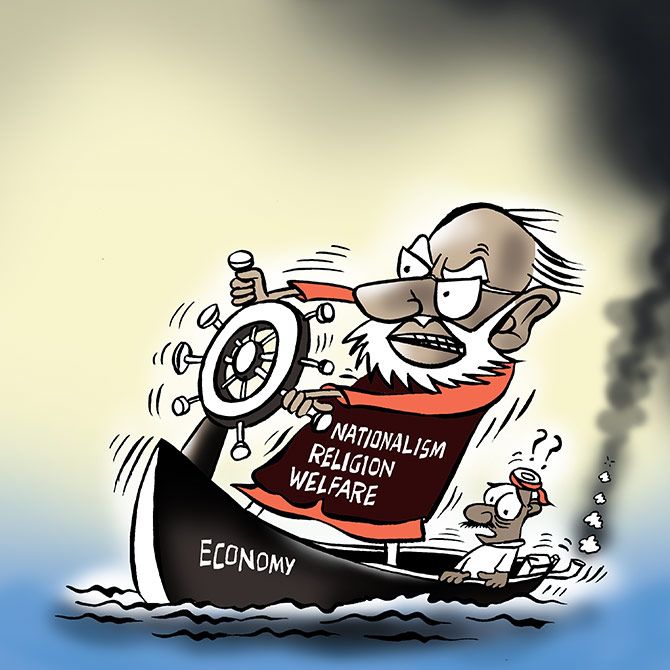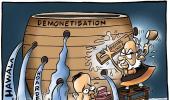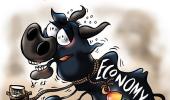The winds of nationalism laden with religion will now yield to those of concern over the stalled economy, unemployment, and a general malaise and unhappiness, predicts Shekhar Gupta.
Illustration: Uttam Ghosh/Rediff.com

It has been an extended monsoon this year.
Finally, the wind patterns are now reversing.
In the capital, they now become dry, come from the west, over Punjab -- and Haryana -- bringing along the burning stubble smoke.
Autumn is here.
Not quite as clearly as this, but political winds have also shifted.
For a couple of years now, as the economy has stalled, the BJP has unleashed the winds of hyper-nationalism with religion (Hinduism) liberally stirred in.
This peaked in the months leading up to the general elections, especially with Balakot and Abhinandan.
Once a voter was convinced India had faced an existential threat from Pakistan for seven decades, nobody had done anything about it, and Narendra Damodardas Modi was nailing the problem, with a finality.
And that while he would do it mostly by 'decisive, deterrent and fearless' military punishment, he was also raising India's global stature to 'isolate' Pakistan.
Once enough voters buy into these, they will forget their other, traditional political loyalties and binaries.
The rest then followed.
Pakistan is Muslim, it spreads terrorism in the name of jihad, bloodthirsty jihadis are a pestilence for the entire world.
Again, the insinuation was that the threat was pan-Islamic, Indian Muslims were not immune, and Hindus needed to consolidate.
Of course, all this would not have worked so well, but for the spectacularly efficient distribution of almost Rs 12 trillion in visible welfare to the poor: Cooking gas, toilets, homes, and MUDRA loans.
In electoral terms, this was a devastating mix: Nationalism, religion, welfare.
The Opposition's Rafale talk only invited derision and the issue of the day, even the post-demonetisation growth decline and rising joblessness, was overlooked.
The two assembly elections have given our first indication that those winds are shifting.
It is definitely not as if Modi has lost any popularity. If he had, the BJP would have at least lost Haryana.
It was still his pull that kept sufficient numbers of voters still with the BJP.
They have depleted substantially from five months ago: By 21.5 percentage points in Haryana, from 58% to 36.5%, for example.
But enough still to enable Modi to hail a double-victory on the evening of counting day.
The early highlights of the India Today-Axis exit poll, the most trusted of all lately, gives us some indications.
In Haryana, it shows that while the BJP still has a healthy overall lead (almost 9 percentage points) over the Congress, in many categories -- rural youth, unemployed, farmers, farm labour -- it has fallen behind.
It must be that in a largely rurban state, the middle class, upper castes, and the sizeable Punjabi population have stayed committed and saved it greater embarrassment.
Similarly, in Maharashtra, where the party had run a pretty good government under a clean and well-liked chief minister, it suffered sizeable reverses rather than improve, as was widely expected.
Further, the Opposition's ranks were depleted, with key leaders from both the Congress and National Congress Party defecting to the BJP, or facing the wrath of the 'agencies'.
If this relatively indifferent victory came despite these overwhelming advantages, it is important to see who and what broke the party's blitzkrieg.
If it was Sharad Pawar's NCP rather than the much bigger Congress that stood in the BJP's way, especially in mostly rural western Maharashtra, it is evident that many farmers and the unemployed have now switched sides.
And remember, all of this happened within 11 weeks of the scrapping of Article 370 in Kashmir, five weeks of 'Howdy, Modi!', the talks with Donald Trump and the speech at the UN general assembly.
Add to these the television spectacle of Mamallapuram with Xi Jinping, P Chidambaram, and D K Shivakumar's arrest and key NCP leader Praful Patel's inquisition for an alleged 'terror-financing link with Iqbal Mirchi' -- and moreover, while the hearings on Ayodhya were going on on a day-to-day basis in the Supreme Court, bringing the issue back into the national consciousness.
If so many voters shifted in spite of all these factors, within five months of May, it is sufficient indication that the bountiful winds of nationalism, anti-Pakistanism, and religious fervour that overwhelmed with emotion the relatively 'mundane' concerns of economics and jobs, are now retreating.
More voters are now returning to the basics.
Travelling in the general election campaign we would often run into poor, jobless people who'd complain they were hurting, that the promised boom hadn't come.
Yet they said they will vote only for Mr Modi: 'Desh ke liye (for the nation)'.
That sentiment has not receded.
But see it like that voter: I have already overlooked all my personal challenges to vote for Mr Modi to protect my nation.
The nation is safe.
Now tell me what are you doing for what is really hurting me: Falling incomes, unemployment, and, for farmers, mostly static procurement prices.
My central proposition, therefore, is that the winds of nationalism laden with religion will now yield to those of concern over the stalled economy, unemployment, and a general malaise and unhappiness.
Fresh noises and action on Pakistan, Kashmir, and terror will not be able to reverse these.
Except, in the most unlikely event of a larger armed conflict.
Will a favourable Supreme Court decision on the temple make a difference? Maybe to some, in the Hindi heartland.
But not enough.
Too many people are hurting too deep now.
They want the return of economic optimism.
We complain often about frequent elections in India.
The BJP is in the forefront with the idea of one-country, one-election.
Yet, it is the Modi government that didn't want elections in Jharkhand simultaneously with Haryana and Maharashtra.
Maybe they had sensed trouble? More likely, they understand they have only one vote-getter, so it is better to give Mr Modi sufficient time in all three states.
Whether it proves counter-productive now we will know soon enough in Jharkhand.
Whether the early winds of change from distant Haryana in the north and Maharashtra in the west will reach there we can only guess.
But definitely, the Opposition will have its tail out of its legs at last.
Cruel thing is, in an all-conquering personality cult, where all victories are credited to one leader, it is tough to immunise him from setbacks.
Especially today, when it doesn't even take defeat, but a narrower 'points' victory rather than a knockout of the rivals is seen as disappointing.
The best thing with India's never-ending cycle of elections is, politics never freezes.
Not long after Jharkhand, elections will come to Delhi.
The BJP will then need to take a big call: Whether or not to put Mr Modi in front again, risk its becoming Modi versus Kejriwal, and go for broke.
Will it be worth the risk for a prize that is a small semi-state where the Centre already controls all municipal corporations, land, and police? All I can say is, Arvind Kejriwal looks way better prepared than the Congress was in Haryana next door.
Politics in India takes years, sometimes epochs, to change.
But political seasons do.
You can sense that in the dry autumn air now.
By special arrangement with The Print










